- Accueil
- Entretenir sa malle
- Estimation
- Lexique
- Décoration
- Personnalisation
- Etiquette Hotel
- Blog
- Malle ancienne
- Louis Vuitton
- Modeles
- Toiles
- Serrures
- Lozines
- Etiquettes
- Séries
- Expertise
- Prix du neuf
- Record enchère
- Stars LV
- Contrefaçon
- Nouveauté 2025
- Vanity
- Valise
- Cabine
- Courrier
- Wardrobe
- Automobile
- Fourrure
- Chaussures
- Ideale
- Aluminium
- Explorateur
- Malle à fleurs
- Cadeau VIP
- Jouets
- Chapeau
- Leopold Stokowski
- Albert Kahn
- Tableau
- Lit
- Tiroirs
- Bibliotheque
- Aéro
- Cigare
- Pique-nique
- Alcool
- Pêche
- Marmotte
- Steamer Bag
- Vermeer
- Vendôme
- Georges Vuitton
- Gaston Vuitton
- Homme cible
- Sac petite malle
- Goyard
- Moynat
- Hermès
- Contact
- Ateliers
- Tutoriel : Fabriquer sa malle
- Boutique
Old trunk
HOW TO IDENTIFY YOUR OLD TRUNK?
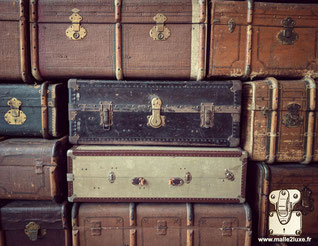
DIFFERENCE BETWEEN A TRUNK AND A SUITCASE?
- Trunk : Light wooden luggage, covered with canvas, interior and exterior . Equipped with a lock and clasps. The trunk has a handle on each side for easy loading and handling.
- Suitcase : The same function as the trunk, smaller, it has only one handle.
WHAT IS AN ANONYMOUS CASE?
| Sommary : |
|

NO MARKING
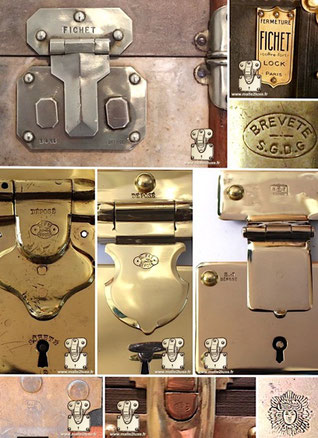
SYMBOL ON HARDWARE

VALUE AND RATINGS

INITIALS
The initials or personalization on the side of the trunk are those of the owner.
HOTEL LABEL
OLD DOMED STAGECOACH TRUNK

The history of trunks is closely linked to horse-drawn travel (animal drawn car). It was not until 1780 to see the first passenger transport companies appear, but they were reserved for an elite. The vastness of the spaces of North America popularized the stagecoaches of various companies, the most famous being the Wells Fargo founded in 1852. The convex trunk meets this new need for travel. Unlike the safe, its purpose is no longer to be a piece of furniture in the house but to be used exclusively to move personal effects during trips. Placed on the roofs of cars, the first domed trunks must now be light and waterproof to protect their contents from bad weather.

WHY IS THE TOP BUCKLED?
As the trunks are not protected from the elements, the cover is curved in both directions so that the rain can flow on either side. The vault also increases the strength of the lid, as does a bridge or barrel (wine barrel).

COATED CANVAS COVERED TRUNK
The luxury houses Louis Vuitton and Goyard produced domed, rustic-made trunks with black painted tin trim.

LONG-HAIR SKIN TRUNK
Old curved trunk covered with long-haired skin.
Can be covered with goatskin, wild boar or other game to protect the contents from bad weather.

AMERICAN TRUNK
The American trunk is a sturdy trunk fitted with ornate decorative iron fittings . Often covered with embossed metal strip.

BASKET CASE (ENGLISH CASE)
Invented in England the basket trunk (basket) has a wicker structure allowing a significant weight gain, it is covered with tarred canvas. The English trunk is lighter and less expensive than wood.
OLD FLAT TRUNK

1860 the start of a new era, it is a revolution , the flat trunks adapt to the mode of transport. More light , less bulky , they can be stacked in the wagon trains and bilge liners. They gradually make bulging trunks disappear . D ' origin all trunks travel are covered , to protect the contents from dust, insects and moisture. There is therefore no rounded or flat trunk in raw wood. Many trunks have been denatured by removing the original canvas to leave the wood visible.

LUXURY TRUNK
Around 1870 Louis Vuitton, Goyard and Moynat understood that it was necessary to create trunks that were at the same time innovative, arranged, light and aesthetic . Arranged as a showcase highlighting French know-how, nothing is too beautiful, it is the beginning of luxury trunks.

AUTOMOTIVE TRUNK
At the end of the 19th century, automobiles did not fit into their storage bodywork. The car chassis was bought on its own and then entrusted to a coachbuilder, the upholstery to a saddler ... the trunks for their part were entrusted to the trunk maker.
The words "Chest" and "Trunk" will continue on modern motor vehicles designating the storage compartment, located outside the passenger compartment, its main access is from the outside.
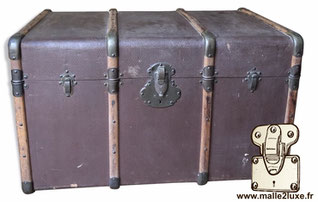
CIRCLED TRUNK
The circled trunk is an inexpensive trunk , produced until the 1970s. The slats are often beech.

MILITARY CASE
Military trunk to store and deliver ammunition, weapons of war and other living on the battlefield.

CAMPHOR WOOD CHEST
The camphor wood chest is essential for the conservation of furs , the peculiar smell persists for several years. This insect repellent repels moths. Assembly of solid wood planks with dovetail , brass corners and hinges. Some call it "naval officer chests" but the name is fanciful. Louis Vuitton and Goyard fur with camphor wood
Tip : This wood is never varnished or waxed of origin, just like cedar wood
it is left raw so as not to trap the aromas that keep pests away. It is therefore obvious not to varnish it above all.
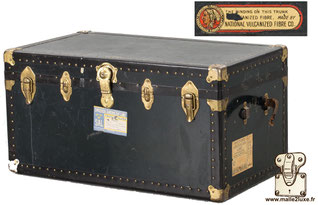
LUGGAGE IN VULCANIZED FIBER
Around 1900, the first vulcanized fiber trunks appeared . The Louis Vuitton House will make this material famous with its trade name: Lozine. Which it will use mainly to protect the edges of the luggage, replacing leather and metal. The other manufacturers will manufacture luggage entirely with this material.

PARCHMENT TRUNK
Old leather trunk covered with parchment, light beige color.

CARDBOARD LUGGAGE
From 1936 and the first paid holidays in France, the production of luggage with cardboard structure exploded, in order to reduce the cost of production and satisfy a wider clientele wishing to go on vacation.
Even Louis Vuitton will do it at the end of the 50s, with its semi-rigid suitcase with cardboard structure like its Stratos models, then Satellite produced until 2000.
FRENCH MANUFACTURER OF OLD TRUNK
Au Touriste

Trunk Au Touriste
n 1847, Michel Flandin founded the Maison Au Touriste.
Known addresses:
36 bis avenue de l'Opéra Paris
Opposite the Monte - Carlo post office
A beautiful brand that offered filled bags, leather goods and a wide choice of automotive trunks as well as wardrobes, mail trunks, drawer trunks ...

Of all qualities: low-end, basket (wicker) trunk covered with plain canvas.
Premium: woven checkerboard canvas with leather trim and brass hardware.

We have referenced several canvases affixed to their trunks:
Striped woven, woven checkerboard, plain coated, stenciled monogram, green embossed ...
There are surely many more.
Some Lavoët trunks have the same fabric as the Au Touriste trunks, which suggests a merger of the two brands.



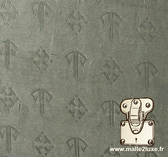
aux etats unis

Founded around 1897 in Paris by Mr Deraisme, despite the surprising name " Aux Etats Unis " is a brand of French trunks.
Family business, father and mother, then son Deraisme took care of it:
In the USA :
Retail trade & Leather goods and travel items
The baggage brand In the United States set up its store at: 229 rue Saint Honoré 75001 Paris.
"In the United States" will have its hours of glory, the address is prestigious close to the Hermes, Moynat, Goyard boutique and the Marshal's workshop (where Louis Vuitton was apprenticed).
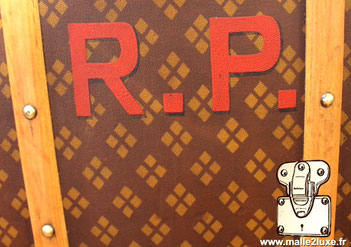
The production of trunks is quite important, made in the backyard of the shop which serves as a production workshop, part of the leather goods are manufactured under contract.
Coated canvas In the United States:
Brown canvas printed with orange diamonds very inspired by the canvas with the mythical monogram of the Maison Louis Vuitton, both by the colors and the pattern. The canvas was made by the company "Lorient L'incrusta".

In 1942, when the father died, the son took over the family business, still accompanied by his mother. After the war, customer demand changed, and the house in the United States had to reinvent itself with more upscale products in a niche market. The house in the United States will then specialize in the welfare of domestic animals and their wealthy owners.
Having no buyer, the brand In the United States disappeared definitively in the 80s, and will fall into oblivion. Gilbert Rotival our master Gainier - Leather goods maker and friend, was for more than 30 years a subcontractor of the son Deraisme.
Lavoët

Lavoët trunk
Founded in 1869, manufactures travel items.
Known address:
175 boulevard Haussmann Paris
Specialty of rush trunks, English trunks and clothes hangers, filled bag.
Some Au Touriste trunks have the same fabric as Lavoët, which suggests a connection between the two brands.




Lavolaille

Trunk Lavolaille
Founded in 1845, the Lavolaille house specializes in trunks for sales representatives, made of wood, fitted with strong handles and straps, with interior arrangements varying according to the objects, they are the ancestors of the "marmot".
Often covered with black canvas, steel or brass border and decorative upholstery nails on the top or face of the trunk.
Some trunks had nails signed "Lavolaille" like the nails "Louis Vuitton *"

Known addresses:
2 rue de Bouloi Paris
3 rue Croix des Petits Champs Paris
11 rue Croix des Petits Champs Paris
Factory: Montrouge
Lavolaille succeeds Katz et Cie.
Lavolaille later joined forces with A Maille, another trunks manufacturer specializing in commercial travelers.


Grands magasins du Louvre

Trunk Grands magasins du Louvre
Created in 1855, by Alfred Chauchard and Auguste Hériot (Chauffard et Compagnie), the Galeries du Louvre will be renamed Grands Magasins du Louvre in 1857 following the expansion of the premises.
It is one of the first Parisian department stores, created only 3 years after the Bon Marché.
The logo engraved on the jewelry is a lion lying at the foot of a Giant letter L. This motif was registered.

It seems that the manufacture of the trunks of the Louvre Department Stores was entrusted to the trunk maker "Au Touriste".
In 1974, the Louvre department stores closed for good.
In 1978, the Louvre des Antiquaires was inaugurated.
In 2016, the Louvre des antiquaires is also closing
In 2024, it will make way for the Cartier Foundation, which will celebrate its 40th anniversary.
Moreau

Trunk Moreau
The Moreau house was founded in 1882, we have few archives on this French house.
Shop Address:
283 rue saint honoré Paris
Brand relaunched in 2011. Discover the history of Moreau Paris trunks.
Paul Romand
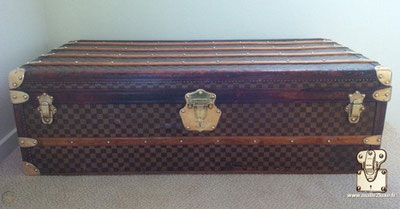
Trunk Paul ROMAND
We have little information on this Parisian brand. Old decorative trunk.
They often use checkered canvas, leather trim, brass handles and solid brass jewelry. They have the particularity of not having nails on the belt of their trunks.
They also produced basketball trunks.
Workshop: 10 rue du 29 Juillet Paris

Known address:
213 rue Saint Honoré Paris
This address is mythical since it is the address where Mr. Maréchal was installed. It was from him that Louis Vuitton learned the trade of layetier and packager, he worked there for 17 years before founding his company in 1854.
From 1997 to 2017, it was the luxury store: Colette who settled there to become the fashion benchmark.
Label Paul Romand fils:
To activity
House founded in 1794
Manufactures of travel articles.
Checkout specialty
Formerly Mermillod House
Packing cases and trunk marcker
Paul Romand Fils
Successor
213, rue saint-honoré
Workshop: 10 rue du 29 Juillet Paris
Wrapping of dresses and fashions furniture, bronze and works of art etc etc
Au Départ

Trunk Au départ
The Au Départ was founded in 1871 by the Bertin Brothers.
Ernest Bertin founded in 1871: Bertin Fils and specializes in the sale of weapons, ammunition, hunting and fishing. He died in 1905.
While his brother Paul founded in 1874 : Bertin Jeune at 29 avenue de l'Opéra in Paris, specializing in travel articles and small leather goods.
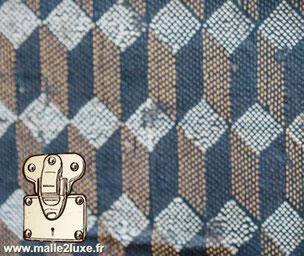
The workshop will be installed in Belleville in Paris.
Around 1900, he created the cubic canvas, a 3-color pattern on a black background forming a geometric design in relief.
In 1920 , Au Départ reached its peak under the leadership of François Bertin (son of Paul Bertin) who now runs the House.
In 1964, when François Bertin died, his son Alain took over the business.

In 1965, Moynat and Au Départ merged .
The boutique at 29 avenue de l'Opéra is closing its doors and it is now the double brand "Moynat Au Départ" which is operated in the historic Moynat shop at n ° 1 avenue de l'Opéra Paris.
Alain Bertin becomes Chairman and CEO of the new joint venture, while Maurice Coulembier is a director.

In 1976 Moynat - Au Départ closed its doors for good.
Brand relaunched in 2019. Discover the history of trunks At the start.
Emile Rabec

Trunk Emile Rabec
Emile Rabec was Louis Vuitton's first apprentice in his studio rue du rocher in 1854.
In 1860 he will manage a branch at number 65 avenue des champs-Elysées, Louis Vuitton will transfer this branch to him later.
Indélicat Emile Rabec will continue to use the name "Maison Vuitton" and "Louis Vuitton" for his own trunks. But his trunks are not.
Mainly in gray Trianon canvas and steel edging, their manufacture is archaic.

Known addresses:
65 avenue des Champs Elysées Paris
57 avenue Marceau Paris
E Rabec luc
Secure packaging of the most fragile items
Specialty for fashion packaging.
A L'Activité

Trunk A L'Activité
Label of a travel trunk manufacturer which has no connection with the Louis Vuitton company but which uses his name.
Known addresses:
2 rue Madame Lafayette Havre
Workshop: 42 street from the landing stage
Atelier : 42 rue du débarcadère

Label:
To activity
FIC Vuitton & company
Packers, gift boxes, layetiers
Special manufacturing workshops for the manufacture of trunks & boxes for ladies.
Bronze medal 1868 boxes for export
Maritime exhibition of the harbor, travel articles
Constant Vuiton

Constant Vuiton trunk
Constant Vuiton is a friend of the Louis Vuitton family, he was even his wedding witness but has no connection with the Louis Vuitton trunks.
Known address:
23 rue Caumartin
27 rue Caumartin Paris
Atelier 26 rue Godot de Mauroy also exists with the spelling Mauroi.
The trunks are often covered with gray canvas and steel edging.

Former Dubois house founded in 1816
Factory and store of travel goods
Zinc and tinplate boxes for export
Packer
Billot & Lombard successor
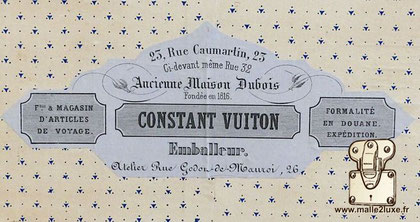
23, rue Caumartin, 23
Opposite same Street 32
Former Dubois House
Founded in 1816
Factory & Travel Store
Constant vuiton
Customs formalities. Shipping
Packer.
Workshop rue Godot de Mauri, 26
M. Goyard

Coffre M. Goyard
Mr. Goyard is at passage Tivoli, 12 bis, near the Saint-Lazare station. packer box maker, has no connection with the company of Goyard trunk maker , created by François Goyard in 1853.
Manufactures of dress boxes, hat boxes for ladies, laundry boxes and boxes for men
Shipments in the provinces and abroad formalities for French and foreign customs.

Passage tivoli, 12 bis, near saint lazare station (Paris)
Mr. Goyard
Boxer - packer
Patented sgdg
Goyard

Old Goyard box
Goyard is located at 18 rue du Louvre in Paris. packer box maker, has no connection with the business of trunk maker Goyard Ainée , created by François Goyard in 1853.
The boxes of this Goyard from the rue du Louvre are on the outside in raw wood with the belt and the inside in green paper, the closure is secured by a leather strap.

18, Rue du Louvre
Travel Item Factory
Goyard
Shipper packer
Paris
La malle Bernard

Acting as an irreducible Gaul, La Malle Bernard is a family business spanning 4 generations, still in operation.
In 1909 Jules BERNARD (1876-1949) settled under the name Jules Bernard.
The company specializes in luggage for sales representatives and automobile trunks.
In 1930 deposits of the La Malle Bernard ® brand
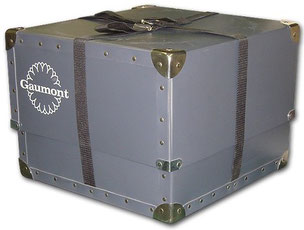
In 1950 Adrien Bernard (1906-1971) son of Jules registered the La Palourde ® brand , cases and marmots in vulcanized fiber.
In 1971, when Adrien Bernard died, these two sons, Rémy and Dominique, took over the family business.
In 1994 Eric, 4th generation joined the company. They relocate manufacturing to Coudres in Normandy.

Specialized among other things in the manufacture of luggage for sales representatives (VRP), cases for musical instruments, entertainment, sales, audiovisual and cinema tools.
In 2000, they will expand their production to bespoke luxury luggage.
Meunier

Meunier trunks
Manufacture of trunks, crates and marmots
Manufacturer specializing in travel items
Address :
34 Faubourg Poissonnière in Paris
Successor foal
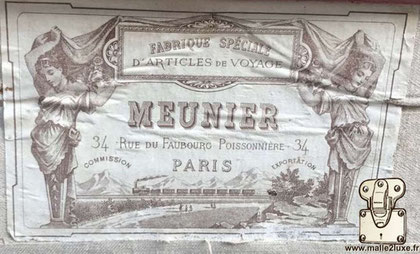
Special factory
travel item
Export commission
OTHER BRANDS OF FRENCH TRUNK:
P. Duprey - Bazar du voyage - Paul Ruquier - Variot - Carret - Malard - Bercher - Cosmopolitan - Transatlantique
AMERICAN MANUFACTURER OF OLD TRUNK:
Innovation
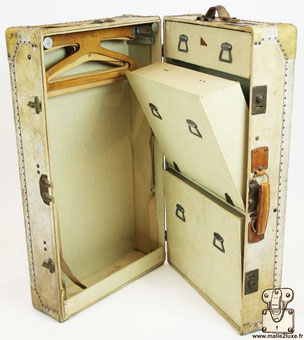
Innovation trunk
An American company created in 1898 by SW Bonsall, the brand produced large series of trunks, it even boasts of having the largest travel goods factory in Europe in the 1930s.
She will file numerous patents in France and abroad.
Its specialty being wardrobes (wardrobe trunk), it will also produce suitcases, cabin trunks, automobile trunks and other travel items.
They will also offer a range dedicated to interior fittings, dressing rooms and cupboards as well as musical items (portable phonograph, etc.)
Many wardrobe trunks from Innovation have a rounded top to facilitate the evacuation of the rain and also to identify its opening direction.

Known addresses:
2 rue de Sèze Paris
34 rue des Petits Champs Paris
10 rue Auber Paris
104 Champs Elysées Paris
237, rue Saint Honoré Paris
329 5th Avenue New York
10 east 47th Street New York
Boston
Philadeliphia
Chicago
53 New Bond St. London
Factory in USA: Bayess (New Jersey)
Factory in France: Vincennes
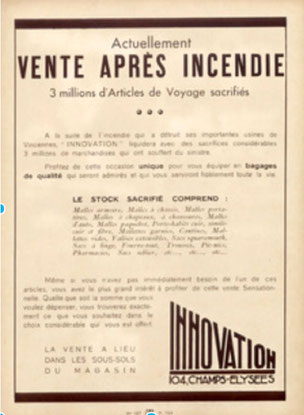
1931 - Fire at the Vincennes factory
Following the fire which destroyed its important factories in Vincennes, "INNOVATION" will liquidate with considerable sacrifices 3 million goods which suffered from the disaster.
Take advantage of this unique opportunity to equip yourself with quality luggage that will be admired and that will serve you faithfully for life.
The sacrificed stock includes:
Wardrobe trunks, Frame trunks, Portable trunk, Hat and shoe trunks, Car trunk, Ocean liner trunk, Leather, imitation
leather and fiber clothes rack, Station cases, Canteens, Empty cases, Suitcases Stretch bags, Squaremouth bags, Laundry bags, Tote bags, Pencil cases, Picnics, Pharmacies, Saddle bags,
etc.
Even if you don't immediately need one of these items. You have the greatest interest in taking advantage of this sensational sale. No matter how much you want to spend, you will find exactly what you want in the enormous choice available to you.
The sale takes place in the basement of the store.
We can no longer find traces of this brand from the 60s.



The Oshkosh Trunk Compagny
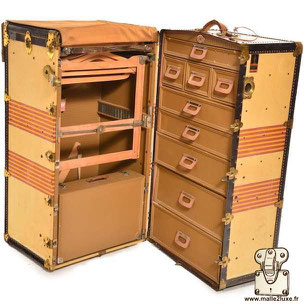
Founded in 1898 in Oshkosh, Wisconsin (USA), the company produced its first trunks called "Chief" (Indian chief) covered with red and yellow striped canvas.
Their logo represents the Indian chief of the Menominee tribe "Os-kosh" (1795 - 1858), which means "claw" and which will give its name to the town of Oshkosh in Wisconsin.
In 1902, the company was named The Oshkosh Trunk Compagny.
In 1919, Belber Trunk & Bag acquired the Oshkosh Trunk Co.

In 1920, a factory, as well as offices and shop were established on Arch Street in Philadelphia and became the world's largest manufacturer of travel goods.
In 1939 The Oshkosh Trunk Company was acquired by the Plotkin Brothers Company , a Chicago company.
The Plotkin Brothers companies owned several other luggage companies.
1961 the Oshkosh plant closes following a difficult period.
1962 Oshkosh Trunk Compagny disappears.
In 2014, the Oshkosh Trunk company was relaunched by a company called Chief Trunk. The name refers to the Indian chief and the striped canvas refers to the heyday of the brand. The label's intellectual property rights had expired, falling into the public domain.

Patent pending
Between 1912 and 1949 Oshkosh Trunk Co filed more than 28 patents for its trunks
They are proudly referenced on a plate riveted to the trunk, a good way to date your trunk.



Hartmann
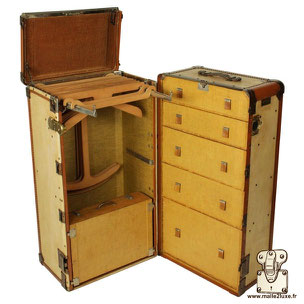
Hartmann trunks
Since its creation in 1877 in Milwaukee, Wisconsin, Hartmann has produced many trunks including a large quantity of wardrobes in the 1920s and 1930s, he is a major player in the United States.
Acquired in 2012 by Samsonite to embody the group's high-end luggage in Europe.
OTHER BRANDS OF FOREIGN TRUNKS:
Wheary - Neverbreak
OTHER CONTEMPORARY TRUNK MAKERS
Pinel & Pinel

The French company Pinel & Pinel works in the manufacture and sale of luxury products, particularly in the fields of leather goods and contemporary briefcases.
In 1998 Fred Pinel creates the company Pinel & Pinel which develops accessories for smokers and small leather goods.
In 2002, he was noticed for the manufacture of cigar cases for sale at Colette and achieved great success.

In 2004 , Pinel & Pinel designed its first trunks.
In 2006, Pinel & Pinel stood out for their collaboration with Nike, by making a black and red grained leather trunk, comprising the collection of twenty-two pairs of Air Jordan shoes, a bang and Olufsen flat screen, and a DVD player. . The interior is autographed by Michael Jordan himself!
Dimension: 204 cm x 120 cm x 70 cm
Sold for 70,294 euros at Artcurial on November 27, 2006

They will create the signed crisscross canvas: Pinel & Pinel available in several colors.
The workshops are in Paris.
It is a great success for a brand of contemporary trunks.
Pinel & Pinel now has 5 stores all over the world.
Paris - Texas - Japan - Macao - Hong Kong
T.T. Trunks
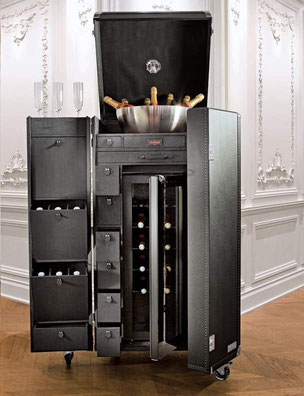
TT Trunks was created in 2009 by Julien Trossat, an engineer by training, he worked for 3 years at Louis Vuitton.
Creator of contemporary trunks, practically all electrified and mounted on casters.
All the trunks are made in Spain.
The customers for these trunks are mainly:
- Hotel industry
- The decorators
- The stores
- Some foreign individuals (American, Chinese and Middle Eastern.)

2015 opening of their first boutique at 32 avenue de Matignon 75008 Paris.
A prestigious address that portends a beautiful trip.
Unfortunately, following the coronavirus, the shop is closing in October 2020.
READ ALSO:

Birth of wooden chests and sideboards
The history of chests dates back to the beginning of human history on the 7 continents, it is the first piece of furniture made by man. ...Read more
Malle ancienne : French page
Copyright © 2008-2025 Malle2luxe Paris. Tous droits réservés.

